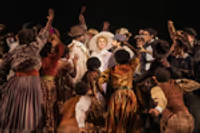Indecent Closing
#25Indecent Closing
Posted: 6/14/17 at 3:01pm
I think that tweet is tacky beyond belief.
#26Indecent Closing
Posted: 6/14/17 at 3:07pm
"I personally feel both shows deserved better from critics and audiences alike."
Again, plays don't deserve anything - you write them, produce them, put them out there, and they find an audience or they don't. Blaming others for one's own failure(s) is excessively immature and ultimately self-destructive.
#27Indecent Closing
Posted: 6/14/17 at 3:08pm
If you think the decks are not stacked against female artists in the theatre, you are oblivious.
#28Indecent Closing
Posted: 6/14/17 at 3:12pm
Exactly, Smaxie.
Look at all Vogel had to do to get a Broadway debut, for god's sake. Practically the dean of American playwrights right now. Compare that to a relative baby like Lucas (whose play she praised in the following tweet).
An artist, particularly of Vogel's stature, has every right to point out the cruel realities of this industry, and social inequity anywhere else.
#29Indecent Closing
Posted: 6/14/17 at 3:20pm
^^^^Exactly.
I think it's pretty obvious that this season has been a lot less diverse than the last one, excluding the Great Comet, maybe. Vogel isn't dissing anyone else, she's just acknowledging the truth that theatre, despite making a lot of great strides, is not always the most open to female writers and directors, but neither is the film industry.
#30Indecent Closing
Posted: 6/14/17 at 3:20pm
I think it might be verging on a kind of paranoia to say that Vogel's prior plays were not produced on Broadway because she's a woman. And, personally, I thought Hnath's play was the better of the two. I haven't seen Oslo, but Rogers has been plugging away for 25 or so years and this is his Broadway debut - what's the excuse for that?
#31Indecent Closing
Posted: 6/14/17 at 3:22pm
Except that social inequality is not the sole factor at play. Certainly it's astonishing that neither have been on Broadway before. But Brantley and Green are both cosmopolitan gay liberals who agree with Nottage and Vogel's politics, agree with your state-of-the-theater assessment, have liked their other works, and likely wanted to like these plays. Neither did.
When leftist gay New York arts critics are painted as oppressive conservative forces willfully enforcing a patriarchal white agenda, it's time to take a step back and laugh at the painting.
#32Indecent Closing
Posted: 6/14/17 at 3:28pm
Exactly, M.O.A.I. - we liberals believe that we are immune from knee-jerk responses, and it's far from true, when a party line is espoused that basically implies that the work of women artists and artists of color are beyond reproach, because not only can any criticism of such work only come from misogyny and/or racism, not bestowing all available commercial awards upon these works is also a work of fascism and white patriarchy.
#33Indecent Closing
Posted: 6/14/17 at 3:34pm
OK then. Answer why David Harrower's Blackbird was seen on Broadway, but not How I Learned to Drive?
#34Indecent Closing
Posted: 6/14/17 at 3:34pm
I'll add that neither man panned either show, and that all four reviews were measured, clear, and well-reasoned. It's facile to dismiss an argument without engaging with it, but it's stupid and absurd to ignore the arguments made altogether in favor of unconscious prejudices for whicu there is no evidence.
#35Indecent Closing
Posted: 6/14/17 at 3:36pm
Smaxie said: "OK then. Answer why David Harrower's Blackbird was seen on Broadway, but not How I Learned to Drive?
"
Sure, it's absurd that it's taken this long. But Brantley and Green aren't producers or artistic directors and that wasn't Vogel's main contention.
#36Indecent Closing
Posted: 6/14/17 at 3:38pm
You are still missing the point, newintown. I think the true "paranoia" in this issue is from liberal folks who can't handle any hint of social criticism and want to shut down conversation . People who immediately think they are being painted as monsters, and who they think they can't possibly have any prejudice buried in their heart or their behaviors. Lisa Kron said it most succinctly: Men are given opportunities based on their potential. Women are given opportunities based on achievement. Looking at the Broadway landscape in recent years, I think that this is absolutely so. Our greatest female writers wait forever to be produced while middling plays by clever men get shot after shot after shot. We have a cultural idea of what a young up-and-coming genius looks like, and that image is a man. There are exceptions to this, as there are to everything. But there is no doubt in my mind that if Paula Vogel had been a man, How I Learned to Drive would have reached Broadway. It is one of the best-known plays of the past twenty-five years. Lynn Nottage's first Pulitzer Prize-winning play would have been seen on Broadway. Annie Baker probably would have had a play on Broadway by now. I truly don't think there's any accounting for it, when you look at the profound mediocrity of so many Broadway plays by men in recent years.
Updated On: 6/14/17 at 03:38 PM#37Indecent Closing
Posted: 6/14/17 at 3:39pm
Smaxie--beat me to it with the Blackbird comparison! I sat there last season just thinking--this is How I Learned to Drive, but more gross and not as good.
Updated On: 6/14/17 at 03:39 PM
VintageSnarker
Broadway Legend Joined: 1/30/15
#38Indecent Closing
Posted: 6/14/17 at 3:40pm
phan24 said: "She's blaming Brantley and Jesse Green for praising the other plays (by or about straight white men presumably) and for not praising Indecent and Sweat, not directly blaming straight white men. Overall unnecessary IMO though.
I don't think they have that much power but while it's not the most virtuous act to lash out when your show announces closing, I think it's at least somewhat warranted if you read Green's review for Indecent. I did think it was odd how he constructed it, lavishing praise on Oslo and criticizing Indecent and Sweat. It felt unnecessary and the optics weren't great. I feel like this was discussed... probably in the Indecent reviews thread.
#39Indecent Closing
Posted: 6/14/17 at 3:41pm
BroadwayConcierge said: "She's blaming straight white men for the failure of her commercial theatrical production in a dense season? Really?
"
I'm a straight white male and I paid money to see the show. I thought it was a rather boring night at the theatre but I guess I can blame my race, gender and sexuality as to why I thought that lol
#40Indecent Closing
Posted: 6/14/17 at 3:42pm
I don't disagree with any of that. But Paula Vogel's tweet had absolutely goddamn nothing to do with that. She implied Ben Brantley and Jesse Green's misogyny resulted in Sweat and Indecent's mixed notices, which is ludicrous.
#41Indecent Closing
Posted: 6/14/17 at 3:45pm
Broadway Joe said: "I'm a straight white male and I paid money to see the show. I thought it was a rather boring night at the theatre but I guess I can blame my race, gender and sexuality as to why I thought that lol"
LOL.
#42Indecent Closing
Posted: 6/14/17 at 3:50pm
I don't think she's saying Brantley and Green are, like, mustache-twirlingly out to get women. But I also don't think it's unfair for her to say that they helped close the plays down, and I believe the implication is that there is a real lack of diversity in high-profile criticism. There is, and that is going to manifest in some way. And unless you believe that there is an objective measure of quality (that for some reason all these white guys seem to be the arbiters of), I can see why this would be upsetting.
For the record, I do think Brantley has shown a streak of genuine casual misogyny in his reviews lately.
#43Indecent Closing
Posted: 6/14/17 at 3:51pm
I think it's also disappointing because Vogel's play is about queer women and so few of those stories get told in theatre, Broadway or otherwise, yet we get god knows how many plays about well-off white gay men. I am a white gay man, the disparity is troubling.
#44Indecent Closing
Posted: 6/14/17 at 3:51pm
How about we blame ridiculous ticket prices for a 1 act show with basically no set or major stars. I understand thats not how we should exactly base ticket prices for shows because theatres are expensive to rent but I still think it's a major factor, especially for plays.
I saw the show through TDF but not everyone has access to that but I would have never paid 99-139 bucks to see this show.
#45Indecent Closing
Posted: 6/14/17 at 3:57pm
"For the record, I do think Brantley has shown a streak of genuine casual misogyny in his reviews lately. "
His review of Venus (and the Times blurb of it) was also pretty questionable from a racial perspective.
#46Indecent Closing
Posted: 6/14/17 at 3:59pm
There might be something to be said for the lack of diversity among critics, but the fact is that Jesse Green and Ben Brantley are currently the ones hired to be critics at the Times and it's their job to give their honest opinion. Should they suddenly claim to enjoy a piece of theatre just because they feel that they may be inherently biased against it? Of course not, don't be ridiculous.
I also doubt that there was a racial or misogynistic element at play here, if only evidenced by the fact that the two of them have expressed serious admiration for both authors in the past.
Also, of course it's harder for women and people of color to get their plays on Broadway, but of course Broadway is nowhere near the best of New York or American theatre. One need only look at the number of plays Richard Greenberg has gotten to Broadway to know that it's hardly the best of New York. Look at this year's Pulitzer. Two women and one gender non-conforming person, one of whom was black. 2016's Pulitzer had two people of color. 2015's had a black woman and Egyptian man. 2014's Pulitzer nominees were three women. 2013's had a man of color and two women. People can dispute the quality of the Pulitzer nominees, but they are somewhat representative of the major plays being produced in America nowadays, and all those plays are being produced. There might be gender or racial discrimination in theatre, but it's far less than any other art business. It's only Broadway, and really Broadway is irrelevant in terms of artistic quality, and even its discrimination is relatively minor.
#47Indecent Closing
Posted: 6/14/17 at 4:02pm
"...but of course Broadway is nowhere near the best of New York or American theatre."
THIS cannot be said enough. The best plays today are to be found at regional theatres and Off Broadway. Sometimes they transfer to an uptown commercial run, but Broadway is, for the most part, tourist fodder.
#48Indecent Closing
Posted: 6/14/17 at 4:07pm
But unfortunately, what plays Broadway (and especially what wins the Tony) has a huge hand in dictating what is produced in regional theaters around the country. I swear to God, if I have to see yet another Vanya and Sonia... or Red in a season announcement...
#49Indecent Closing
Posted: 6/14/17 at 4:12pm
Right. It also feels like backpedaling to say "Well, Broadway isn't where the best stuff plays, so who cares who makes it there anyway!". Of course there's often great work being done off-Broadway, but Broadway is where the most money and attention are.
Videos








